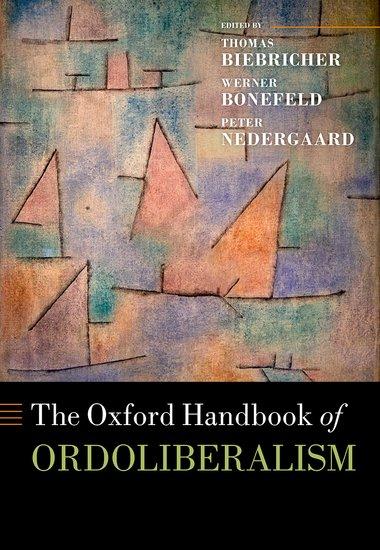This Handbook provides a comprehensive study of ordoliberalism from the intellectual origins and prime exemplars to its main theoretical themes and practical applications up to the most recent debates taking place across a range of disciplines.
Inhaltsverzeichnis
- Introduction
- 1: Thomas Biebricher, Werner Bonefeld, and Peter Nedergaard: Why a book on Ordoliberalism?
- Part I. Contexts
- 2: Bertram Schefold: Theoretical context: Ordoliberalism as a new synthesis of earlier German economic thought
- 3: Ralf Ptak: Historical context of the theoretical formation: Weimar democracy, Weltwirtschaftskrise and the rise of National Socialism
- 4: William Callison: Historical Context of Ordoliberalism's Theoretical Development
- 5: Philip Mirowski: Ordoliberalism within the Historical Trajectory of Neoliberalism
- 6: Thomas Biebricher: Ordoliberalism and Conservatism
- Part II. Key thinkers and key texts
- 7: Manuel Wörsdörfer: Walter Eucken: Foundations of Economics
- 8: Michelle Everson: Franz Böhm: Private Law Society and Lessons for our Age
- 9: Raphaël Fèvre: Wilhelm Röpke: The Social Crisis of Our Time
- 10: Stefan Kolev and Nils Goldschmidt: Alexander Rüstow: The Failure of Economic Liberalism
- 11: Ralf Ptak: Alfred Müller-Armack: The "State Idea" and the Economic Order - Metamorphoses from 1932 to 1978
- 12: Ralf Ptak: Leonhard Miksch: "Competition as a Task" in Science, Journalism and Politics
- 13: Christian Joerges: Ernst-Joachim Mestmäcker: A vision of European Economic Constitutionalism
- 14: Malte Dold: Viktor Vanberg: The Constitution of Markets and Public Choice
- 15: Viktor J. Vanberg: Adam Smith: Classical Political Economy and Ordoliberalism
- 16: Alec Dinnin: Ortega y Gasset: The fear of mass society
- 17: Renato Cristi: Carl Schmitt: Decisionism
- Part III. Political economy
- 18: Klaus Tuori: Economic Constitution and the State
- 19: Dieter Plehwe: The Economic State and the Ordoliberal Critique of Keynesianism: Anti-economic state or just a different type of economic state?
- 20: Jonathan White: Rule of Law (Rechtsstaat) and Social Order
- 21: Ralf Havertz: The Strong State and "the Taming of Freedom"
- 22: Hagen Schulz-Forberg: Balancing the World: (De-)centralisation, regionalism, and international organisation in the world economy
- 23: Josef Hien: The Social Market Economy and Ordoliberalism - a difficult relationship
- Part IV. Politics
- 24: Joshua Rahtz: The Politics of Order and Law: Ordnungspolitik
- 25: Rune Møller Stahl: Politics and the Order of Society
- 26: Astrid Séville and Sebastian Pieper: Politics of Decision-Making: Government by Experts and the Politics of Depoliticisation
- 27: Philip Manow: Myth, Religion, and Social Market Economy
- Part V. Policies
- 28: Angela Wigger: Competition Laws and Their Enforcement in theProject of European Integration. An Artefact of Ordoliberal Influence?
- 29: Ekkehard A. Köhler: Ordoliberal Economic Policy
- 30: Harald Hagemann: Economic Crisis Policy
- 31: Harald Hagemann: Labour Market Policy
- 32: Jörg Bibow: Walter Eucken on Currency Matters and Central Banking
- 33: Stefan Kolev and Nils Goldschmidt: Vitalpolitik
- 34: Lars Cornelissen: Post-War Ordoliberalism, Race, and the Politics of Development
- Part VI. Contemporary issues
- 35: Quinn Slobodian: Ordoliberals on Federalism and Europe
- 36: Federico Bruno: Eurozone Policy and Crisis
- 37: Remi Maier-Rigaud: Social Policy in an Entrepreneurial Society
- 38: Frieder Vogelmann: Ordoliberalism as Political Rationality in Foucault's Genealogy of Liberalism

































